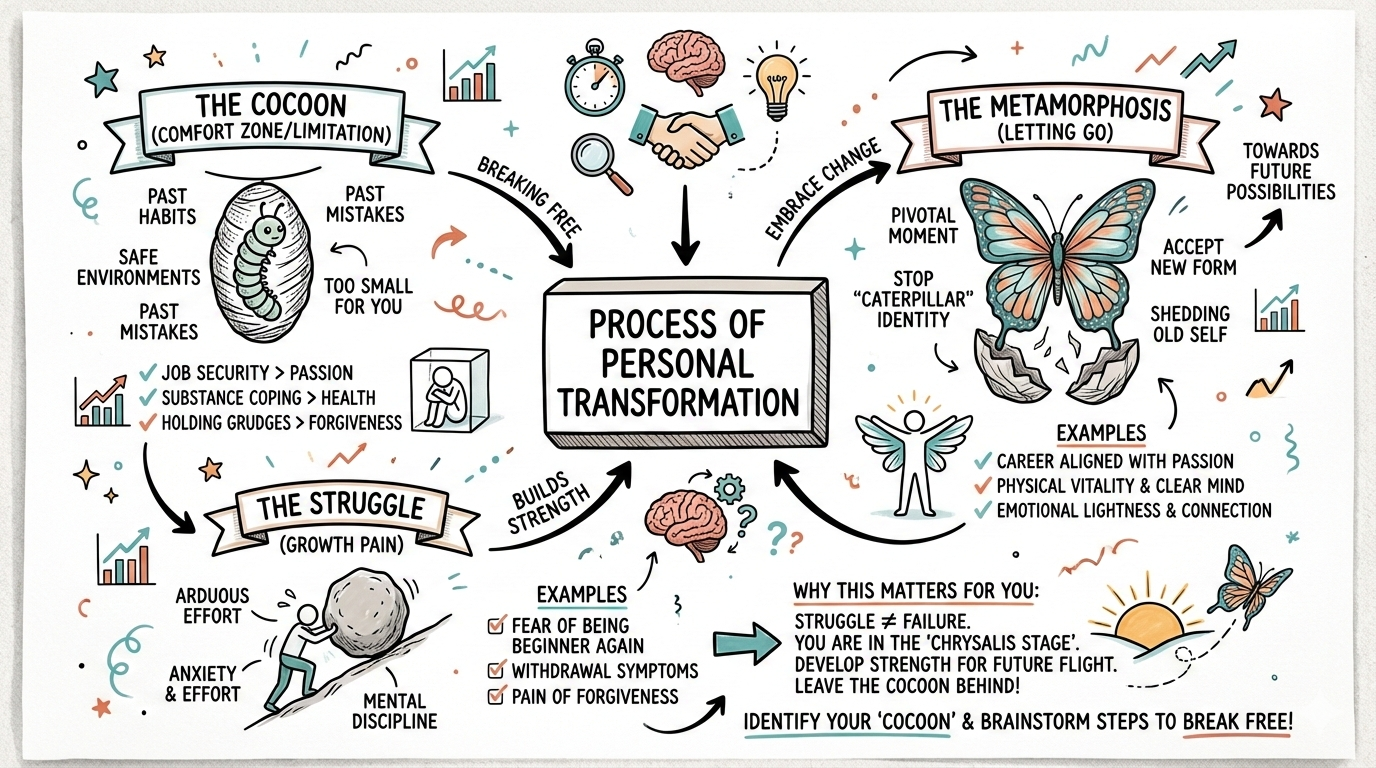"Yesterday is not ours to recover, but tomorrow is ours to win or lose."
- Lyndon B. Johnson
Tale of a Butterfly
“In the vast tapestry of life, there lies a poignant tale of a butterfly. Once trapped in the confinements of its cocoon, the butterfly struggled to break free and emerge into a world of possibilities. The struggle was arduous, and the past life as a caterpillar seemed like a distant memory. But in that moment of transformation, the butterfly discovered the beauty of letting go.
The wings that once crawled on the ground were now capable of flight, and the creature embraced the sky with newfound freedom. The cocoon, a symbol of the past, was left behind as the butterfly soared into a future painted with the vibrant hues of change.
In our own lives, we too find ourselves cocooned by the past—bound by mistakes, heartaches, and missed opportunities. Yet, just like the butterfly, we possess the strength to break free. It’s in acknowledging the struggle, in shedding the weight of what was, that we find the wings to soar beyond the constraints of yesterday.
The butterfly teaches us that the beauty of life lies not in the cocoon but in the courage to leave it behind. As we embrace the winds of change, we discover the extraordinary power of moving on, leaving behind the limitations of the past, and fluttering towards a future filled with endless possibilities.”

Bygone is Bygone
In the intricate tapestry of our lives, the notion of “Bygone is Bygone” emerges as a profound philosophy, urging individuals to navigate the currents of personal growth by releasing the grip on their past. At its core, this concept encapsulates the essence of acknowledging that what has transpired is irrevocable—a chapter closed in the book of our existence. It invites us to part ways with the burdensome baggage of yesterday, fostering an environment conducive to the blossoming of personal growth.
The significance of “Bygone is Bygone” in the realm of personal development lies in its transformative power. It serves as a clarion call to embrace the present moment with unwavering acceptance, unshackling oneself from the chains of regret, resentment, or nostalgia. This philosophy acknowledges that every individual is a work in progress, and the canvas of the future awaits the strokes of newfound wisdom and resilience.
In the journey towards personal growth, the ability to let go becomes a formidable ally. “Bygone is Bygone” encourages a mindset shift—a departure from ruminating on past mistakes or missed opportunities. It empowers individuals to channel their energy into the fertile grounds of the present and future, fostering a sense of liberation that propels them towards self-discovery and positive transformation.
Ultimately, embracing the concept of “Bygone is Bygone” is an invitation to embark on a pilgrimage of self-renewal. It is a testament to the human spirit’s capacity to rise above challenges, learn from experiences, and sculpt a future defined by resilience, courage, and an unwavering commitment to personal growth. As we delve into the exploration of this concept, we uncover the keys to unlocking the doors that lead to a brighter, more fulfilling tomorrow.
Ponder upon this
The importance of rebuilding and focusing on the future
The importance of rebuilding and focusing on the future cannot be overstated, for it marks the cornerstone of personal evolution and the pursuit of a more fulfilling life. As we navigate the intricate labyrinth of our existence, the echoes of “Bygone is Bygone” beckon us to not only release the grip on the past but to actively engage in the art of reconstruction.
Embracing Change and Growth:
- Rebuilding signifies an inherent acceptance of change. It acknowledges that life is a dynamic tapestry, and as circumstances shift, so must our responses and aspirations.
- Focusing on the future becomes a compass guiding us towards growth. It propels us to learn from past experiences, adapt, and cultivate the resilience needed to face the unknown with courage.
Turning Adversity into Opportunity:
- Rebuilding is often born out of adversity. It’s a testament to the human spirit’s remarkable ability to turn setbacks into stepping stones.
- By focusing on the future, we transform challenges into opportunities for self-discovery and improvement. Each obstacle becomes a catalyst for developing new skills and perspectives.
Creating a Positive Vision:
- The act of rebuilding involves crafting a positive vision for the future. It prompts us to define our goals, aspirations, and the person we aspire to become.
- Focusing on this envisioned future imbues our present with purpose, motivating us to take intentional steps that align with our desired outcomes.
Breaking Free from Limitations:
- Rebuilding is a liberating process, freeing us from the shackles of past mistakes or regrets. It encourages a forward-looking mentality that isn’t tethered by the constraints of what once was.
- By focusing on the future, we transcend limitations imposed by our history, enabling us to redefine ourselves and chart a course unburdened by preconceived notions.
Nurturing Hope and Resilience:
- Rebuilding fosters hope—a belief that the future holds the promise of brighter days. It instills resilience, reminding us that setbacks are not the end but rather opportunities for renewal.
- Focusing on the future nurtures a mindset of optimism, reinforcing the idea that, despite past challenges, there exists a canvas upon which we can paint a more vibrant and fulfilling tomorrow.
In essence, the importance of rebuilding and focusing on the future lies in their transformative potential. They empower individuals to sculpt a narrative of growth, resilience, and purpose, ensuring that the chapters yet to be written are filled with the richness of newfound wisdom and possibilities. As we embark on this journey of rebuilding, the compass of the future becomes our guide, steering us towards the realization of our most authentic and aspirational selves.
Acknowledging the Past:
Acknowledging the past is an essential and foundational aspect of personal development, as it serves as a compass guiding individuals toward growth, self-awareness, and a more meaningful life. Here are key reasons why recognizing and understanding one’s past is crucial for personal development:
Learning from Experience:
The past is a repository of experiences, both successes and failures, that serve as valuable lessons. Acknowledging these experiences allows individuals to glean insights, understand patterns, and discern what worked well and what didn’t.
By reflecting on past choices and their outcomes, individuals can make informed decisions in the present and future, contributing to continuous learning and improvement.
Building Self-Awareness:
Examining the past fosters self-awareness by providing a clearer understanding of one’s values, beliefs, strengths, and areas for growth.
Awareness of past behaviors and their impact on oneself and others enables individuals to make conscious choices aligned with their authentic selves, promoting a more purposeful and intentional life.
Identifying Patterns and Triggers:
Patterns of behavior, thought, or emotion often repeat themselves if left unexamined. Acknowledging the past allows individuals to identify these patterns and recognize triggers that may influence current actions.
By understanding these patterns, individuals gain the ability to break unproductive cycles and make positive changes, fostering personal growth and well-being.
Resolving Unresolved Issues:
Unresolved issues from the past can linger and affect mental and emotional well-being. Acknowledging these issues is the first step toward resolution and healing.
Confronting and addressing past wounds allows individuals to let go of emotional baggage, leading to a greater sense of peace, resilience, and emotional freedom.
Cultivating Gratitude and Perspective:
Reflecting on the past, including achievements and positive experiences, fosters a sense of gratitude. Gratitude, in turn, contributes to a positive outlook on life.
Acknowledging challenges and overcoming adversity provides perspective, helping individuals appreciate their resilience and strengths, which are crucial elements of personal development.
Fostering Accountability:
Acknowledging the past involves taking responsibility for one’s actions and choices. This accountability is fundamental to personal development.
By recognizing the consequences of past decisions, individuals empower themselves to make more intentional and responsible choices in the future.
In essence, acknowledging the past is not about dwelling on regrets or living in the past; rather, it’s about extracting wisdom, learning, and self-awareness from past experiences. It lays the groundwork for a purposeful journey toward personal development, enabling individuals to navigate their present and future with clarity, resilience, and a deeper understanding of themselves.
The emotional and mental burden of holding onto past
The emotional and mental burden of holding onto past mistakes or regrets can be profound, affecting various aspects of an individual’s well-being. Here are key aspects highlighting this burden:
Persistent Guilt and Shame:
Holding onto past mistakes often leads to persistent feelings of guilt and shame. The constant replay of the error in one’s mind can create a cycle of negative self-talk, eroding self-esteem and self-worth.
Anxiety and Stress:
Regret and worry about past actions can contribute to heightened anxiety and stress. The mind becomes preoccupied with “what-ifs” and worst-case scenarios, leading to a chronic state of tension and unease.
Impact on Relationships:
The emotional baggage from past mistakes can spill over into current relationships. Individuals may struggle with trust issues, fearing that they will repeat past errors or be judged by others based on their history.
Self-Limiting Beliefs:
Holding onto regrets can foster self-limiting beliefs, convincing individuals that they are defined by their past actions and incapable of change or improvement.
This mindset can hinder personal growth and prevent individuals from pursuing new opportunities or embracing challenges.
Depression and Low Mood:
Prolonged dwelling on past mistakes may contribute to feelings of hopelessness and depression. The inability to forgive oneself and move forward can lead to a persistent low mood and a sense of being trapped in negativity.
Impact on Decision-Making:
Constantly replaying past mistakes can create a fear of making decisions, as individuals may become overly cautious to avoid potential errors.
This fear can hinder personal and professional progress, preventing individuals from taking calculated risks or pursuing opportunities for fear of repeating past missteps.
Energy Drain and Fatigue:
The mental and emotional energy required to ruminate on past mistakes can be exhausting. This constant mental churn diverts energy away from the present and drains an individual’s overall vitality.
Missed Present Moments:
Preoccupation with the past can result in missing out on the richness of the present. Individuals may struggle to fully engage in and appreciate current experiences due to a lingering focus on what has already transpired.
Addressing the emotional and mental burden of holding onto past mistakes or regrets involves acknowledging these feelings, practicing self-compassion, and actively working towards forgiveness and acceptance. It is a critical step in freeing oneself from the weight of the past and fostering a healthier, more positive mindset conducive to personal growth and well-being.


